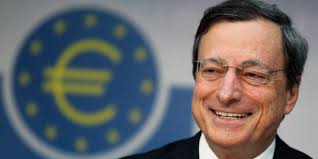
FRANKFURT, Germany (AP) — Europe’s economy is finally showing signs of increasing strength, after years of sluggishness and false starts. And that means the European Central Bank likely won’t have to step up its ongoing 1.74 trillion-euro ($1.93 trillion) stimulus program when it meets this week. There’s little sign that President Mario Draghi and Co. are ready to drop more stimulus news. Some economists are saying don’t expect anything more for the rest of this year, if at all.
The ECB is holding steady just as the U.S. Federal Reserve seems to be moving close to a rate increase at its June meeting. It hiked its key rate in December from near zero to a range between 0.25 percent and 0.5 percent, but then held off any more increases amid unsettling swings in stock markets. Global jitters seem to have eased since then. The U.S. recovery is more advanced, so Fed chief Janet Yellen can contemplate withdrawing some stimulus.So analysts don’t expect any new stimulus jolts to be announced at Thursday’s meeting of the ECB-bank’s 25-member governing council in Vienna.
Fearing a nightmare
Tower Bridge, centre, and the Canary Wharf business district in the distance as the River Thames flows through London, are seen through a window during the official opening of «The View» viewing platform at the 95-storey Shard skyscraper in London, Friday, Feb. 1, 2013. From the international banks in the skyscrapers of Canary Wharf to the traditional home of Britain’s financial industry in the City of London, bankers and money managers across the capital are watching the upcoming June 23 referendum on EU membership with trepidation.
Gina Miller needs to look no further than her own small investment firm to decide that leaving the European Union would be bad for Britain. She has an analyst who is Italian: would he need a visa? She has customers who are British retirees living in Spain: will they return home to keep access to health care and liquidate their euro investments? Her firm, SCM Direct, works closely with French bank Societe Generale: would that relationship continue? «It would be a nightmare,» she said suggesting the impact could be similar to the 2008 financial crisis. «Why would we do this to our country again? And this time it would be of our own making.» From the international banks in the skyscrapers of Canary Wharf to the traditional home of Britain’s financial industry in the City of London and the hedge funds of Mayfair, bankers and money managers across the capital await the June 23 referendum on EU membership with trepidation. Many fear a vote to leave would undermine London’s position as the world’s pre-eminent financial center and damage an industry that underpins the British economy.
The worlds biggest economy
Jamie Dimon, chief executive of U.S. banking giant JPMorgan Chase, underscored those concerns last week when he appeared alongside U.K. Treasury chief George Osborne to make the case for remaining part of the EU single market, which with 500 million people is the world’s biggest economy. In case of a British exit, or Brexit, from the EU, JPMorgan would have to move staff to the continent to ensure it could continue to serve clients who want to invest there, Dimon said. Other global banks with customers in the rest of the EU would be in a similar situation.»A vote to leave would be a terrible deal for the British economy,» he said. «At a minimum, a Brexit will result in years of uncertainty, and I believe that this uncertainty will hurt the economies of both Britain and the European Union.»
Gateway to EU
Britain has been the gateway to the EU for many banks, brokerages and fund managers for decades. In addition to having a trusted legal system and institutions that operate in English, the language of international finance, London is in the right time zone to access most of the Earth during its working day and has a reputation for delivering top-notch financial services. The industry is also surrounded by an ecosystem of expertise — lawyers, accountants and consultants — to support it. Some 60 percent of all European headquarters of non-EU firms are based in the U.K., according to The City UK, which lobbies on behalf of the financial industry. The U.K. hosts more headquarters of non-EU firms than Germany, France, Switzerland and the Netherlands put together. London’s advantages are such that people in favor of leaving the EU, such as Peter Hargreaves, co-founder of brokerage firm Hargreaves Lansdown, think it will retain its luster no matter what. He poured scorn on the notion that it could be easily replicated. «In addition to the cost of building the infrastructure for a rival to the City of London one has also got to work out whether people will want to live in another financial center,» he said. «They certainly wouldn’t want to live in Paris —although Paris is a pretty city — purely because of the tax rates, and in all honesty they wouldn’t want to live in Frankfurt because actually there isn’t even the housing there to house them. People want to live in London.»




